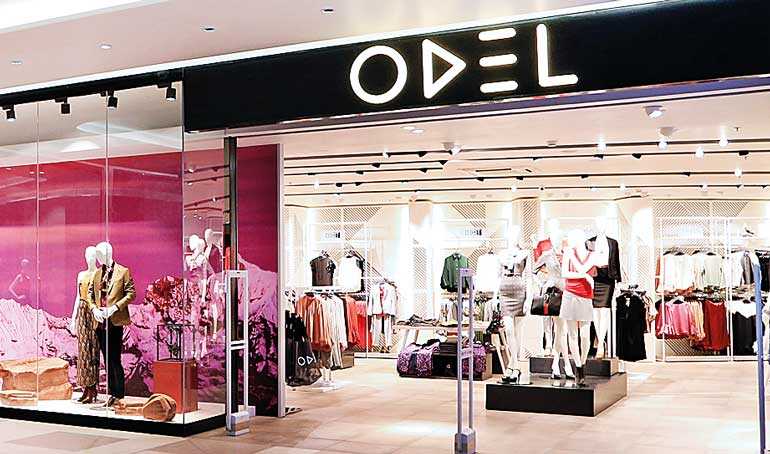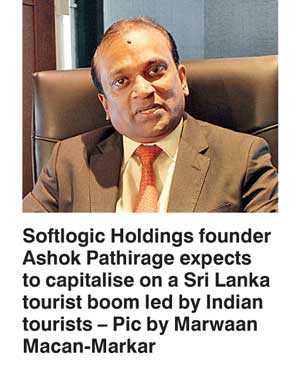Sunday Jan 25, 2026
Sunday Jan 25, 2026
Tuesday, 23 October 2018 00:00 - - {{hitsCtrl.values.hits}}

Sri Lankan tycoon Ashok Pathirage purchased a large stake in high-end fashion store Odel in 2014, the first step in his plans for four high-end shopping malls to open in Colombo over the next five years
Colombo/Tokyo: Sri Lankan tycoon Ashok Pathirage remains bullish about his country’s consumer spending prospects, even as it endures a currency sell-off, and he is turning to foreign investors and contractors to build up his retail business.
Softlogic Holdings, Pathirage’s hospitals-to-financial services conglomerate, recently began building a luxury shopping mall in Colombo that he hopes will boost the country’s credentials as a tourist destination.
The Sri Lankan rupee has dropped 10% against the dollar this year, hitting a record low as the South Asian island’s economy struggles. The World Bank forecasts another expansion of less than 4% this year. Pathirage’s retail ventures depend on domestic demand, and the sliding rupee hurts sales of brand-name imports.
“Obviously, we are raising our prices,” Pathirage said, referring to his mobile phone distribution and other retail businesses.
“We are going through a difficult patch right now,” he recently told the Nikkei Asian Review in Tokyo, where he met with prospective investors as Softlogic works to ease its reliance on the debt that has fuelled its growth.
The conglomerate’s debt level hit 2.71 times equity in March, up from 1.70 times five years ago. Pathirage is now tasked with realising his ambitions in retail while strengthening the company’s balance sheet.
The aspiring Sri Lankan retail king has enlisted a major Chinese construction group to build a luxury shopping mall at the edge of Cinnamon Gardens, a neighbourhood of tree-lined avenues and colonial-era mansions. Pathirage’s decision to eschew local construction companies at the risk of being labelled unpatriotic typifies his business style.
He is unequivocal about his choice of state-owned China State Construction Engineering to build Odel Mall, the intended flagship of his retail group. The estimated $45.5 million investment will cover 67,000 sq. meters, and is slated to open in late 2020 or early 2021.
“I have worked with most of the local contractors. But unfortunately, sorry to say, most of the time there are cost overruns -- despite doing budgets -- and the projects do not finish on time,” Pathirage said in his minimally furnished office. “The Chinese don’t have these problems, and we chose China State after evaluating them purely on merit.”
In 2014, Pathirage shook up Sri Lankan retail by purchasing a large stake in Odel - a high-end fashion store founded decades earlier by a female entrepreneur - with borrowing from Hatton National Bank, a leading domestic commercial lender.
That move heralded his plan for four high-end shopping malls to open in Colombo over the next five years. To keep pace, Pathirage acquired the franchises of 80 major fashion brands including Levis, Prada and Armani, as well as Samsung and Nokia phone distributors, Dell PC vendors, and global restaurant and hotel chains.
“All the brands belong to us, so all the malls are not going to display brands without our approval,” Pathirage said. “We are going after a bigger wallet share of our customer base.”
He also is optimistic about tourists rediscovering the country since the end of its decades-long civil war. Sri Lanka - a nation of 21 million people - drew a record 2.1 million foreign visitors last year, producing $5 billion in related revenue.
“Sri Lanka will have huge opportunity if each tourist increases spending $100 at the new shopping malls,” he said. “They will want more places to shop, and we will be ready with our high-end stores.”
He is banking on Indian tourists, the largest group of arrivals to Sri Lanka followed by visitors from China.
“Sri Lanka can become a good shopping destination for them and a closer alternative to Bangkok,” he said. “There are already many flights bringing Indians to the casinos here.”
Anticipating a rising tide of consumer spending, Pathirage just concluded a deal with a foreign investment company to raise Rs. 3.1 billion ($18.2 million) to restructure Softlogic debt. The private placement stock offer gives Samena Ceylon Holdings, whose parent company is a Mauritius-based investment company, an estimated 19% stake in Softlogic Holdings.
Pathirage also approved raising a further Rs. 3.9 billion with a rights issue of 230.81 million shares. These moves lifted the conglomerate’s capital from Rs. 5 billion at the beginning of 2018 to Rs. 12 billion by the second quarter. The company’s net debt fell to Rs. 54.3 billion by the end of the April-June period from Rs. 57.2 billion in the previous quarter.
But financial analysts say that does little to minimise the significance of Softlogic’s debt story, which lies at the heart of Pathirage’s rise. He grew from an unknown entrepreneur in 1991 who launched a software development company to being lauded as one of the island’s brash new tycoons.
“The group is notable for pursuing an aggressive organic and inorganic growth strategy, which has resulted in a relatively stressed capital structure,” credit rating agency ICRA Lanka noted when Pathirage was trying to raise fresh capital this year through Samena. “The intention [is to strengthen] the group’s balance sheet and financial flexibility.”
Revenue for the group, which has seven listed companies, climbed to Rs. 59.1 billion last year from Rs. 21.8 billion in 2012. The retail segment contributed 51% to group revenue in the second quarter of 2018. Following at 20% was health care, regarded by many analysts as lucrative for Softlogic, which holds the major stake in the listed Asiri Hospital Holdings.
Pathirage’s strategy of growth through debt-fuelled acquisitions prompted Fitch Ratings to downgrade Softlogic’s national long-term rating in 2014 to BBB+ from A-.
But Pathirage remains sold on debt to expand his empire. “We have come to a point where we want to restructure the debt so that our three main clusters in the group, including retailing and health care, can manage their future expansions,” he said.
Pathirage became an entrepreneur in 1991 when he left the IT department of the blue-chip John Keells Holdings, Sri Lanka’s largest conglomerate. With Rs. 1 million (nearly $10,000 at that time) from his savings, he launched Softlogic as a software development company and branched out to become the local distributor for Dell, Texas Instruments and Nokia.
“I always had an ambition to do something, but didn’t know what or how,” Pathirage said.
The young entrepreneur grew up in Colombo, sought work after his secondary education and boasted no business pedigree. His father was the chief accountant at the state railway, and his mother was a homemaker.
“Not coming from a business family has helped me, because most of the family-controlled companies in Sri Lanka are conservative, don’t want to grow and are not interested in acquisitions nor being listed,” he said. “Our companies are not looking to be happy and conservative for our children’s sake.”
Pathirage’s risks led him to build a fortune while surrounded by economic uncertainties. Sri Lanka endured a bloody ethnic conflict that ended in May 2009 after nearly 30 years.
The only bright spot was the country’s major exports, such as garments and tea, which helped the economy grow at a steady clip of 5% a year and propel Sri Lanka to lower-middle-income status. The country’s per capita gross domestic product was $4,065 in 2017, the World Bank says.
(Source: https://asia.nikkei.com/Business/Companies/Sri-Lanka-s-retail-king-taps-Chinese-builder-to-weather-currency-storm)